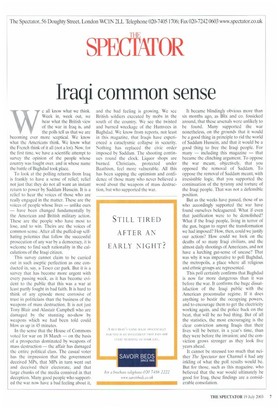Iraqi common sense
-. e all know what we think. w Week in, week out, we hear what the British view of the war in Iraq is, and the polls tell us that we are becoming ever more sceptical. We know what the Americans think. We know what the French think of it all (not a lot). Now, for the first time, we have a scientific attempt to survey the opinion of the people whose country was fought over, and in whose name the battle of Baghdad took place.
To look at the polling returns from Iraq is frankly to have a sense of relief; relief not just that they do not all want an instant return to power by Saddam Hussein. It is a relief to hear the voices of those who are really engaged in the matter. These are the voices of people whose lives — unlike ours — have been changed fundamentally by the American and British military action. These are the people who have most to lose, and to win. Theirs are the voices of common sense. After all the puffed-up selfhating polemics that follow the successful prosecution of any war by a democracy, it is welcome to find such rationality in the calculations of the Iraqi citizen.
This survey cannot claim to be carried out in such aseptic perfection as one conducted in, say. a Tesco car park. But it is a survey that has become more urgent with every passing week, as it has become evident to the public that this was a war at least partly fought in bad faith. It is hard to think of any episode more corrosive of trust in politicians than the business of the weapons of mass destruction. It is not just Tony Blair and Alastair Campbell who are damaged by the stunning no-show by weapons which we had been told could blow us up in 45 minutes.
In the sense that the House of Commons voted for war on 18 March — on the basis of a prospectus dominated by weapons of mass destruction — the affair has damaged the entire political class. The casual voter has the impression that the government deceived MPs, that MPs in turn went out and deceived their electorate, and that large chunks of the media connived in that deception. Many good people who supported the war now have a bad feeling about it, and the had feeling is growing. We sce British soldiers executed by mobs in the south of the country. We see the twisted and burned wreckage of the Humvees in Baghdad. We know from reports, not least in this magazine, that Iraqis have experienced a cataclysmic collapse in security. Nothing has replaced the civic order imposed by Saddam. The shooting continues round the clock. Liquor shops are burned. Christians, protected under Baathism, feel more vulnerable. All this has been sapping the optimism and confidence of those many who never believed a word about the weapons of mass destruction, but who supported the war. It became blindingly obvious more than six months ago, as Blix and co. fossicked around, that these arsenals were unlikely to be found. Many supported the war nonetheless, on the grounds that it would be a good thing in principle to rid the world of Saddam Hussein, and that it would be a good thing to free the Iraqi people. For many — including this magazine — that became the clinching argument. To oppose the war meant, objectively, that you opposed the removal of Saddam. To oppose the removal of Saddam meant, with irresistible logic, that you supported the continuation of the tyranny and torture of the Iraqi people. That was not a defensible position.
But as the weeks have passed, those of us who accordingly supported the war have found ourselves beleaguered. What if even that justification were to be demolished? What if the Iraqi people, living in terror of the gun, began to regret the transformation we had imposed? How, then, could we justify our actions? How could we look on the deaths of so many Iraqi civilians, and the almost daily shootings of Americans, and not have a lurching gut-sense of unease? That was why it was imperative to poll Baghdad, the metropolis, a place where all religious and ethnic groups are represented.
This poll certainly confirms that Baghdad is now far more dangerous than it was before the war. It confirms the huge dissatisfaction of the Iraqi public with the American proconsular regime. If it does anything to bestir the occupying powers, and to encourage them to get the electricity working again, and the police back on the beat, that will be no bad thing. But of all the statistics, the most encouraging is the clear conviction among Iraqis that their lives will be better, in a year's time, than they were before the invasion; and the conviction grows stronger as they look five years ahead.
It cannot be stressed too much that neither The Spectator nor Channel 4 had any inkling of what the poll results would be. But for those, such as this magazine, who believed that the war would ultimately be good for Iraq, these findings are a considerable consolation.


























































 Previous page
Previous page